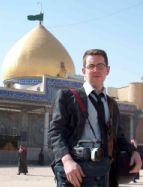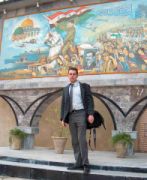From the Open-Publishing Calendar
From the Open-Publishing Newswire
Indybay Feature
Report From Basra, Iraq
Ben Granby is a resident of Madison, Wisconsin. He's currently travelling in Iraq with "Iraq Peace Teams," which directly challenges the sanctions and war against the Iraqi people. Read all of Ben's reports at the Madison Independent Media Center.

After our journey to Abu Falous, we headed back to Basra to have an appointment with an Imam in the relatively new Al-Mousawi Mosque in the downtown area. Immediately, it was set apart from the traditional style of both new and old Shia and Sunni Mosques around Iraq with a clock tower serving as its only minaret. Lacking much décor on its exterior, it was lit up by strings of red, green and yellow lights. Built for a maximum capacity of several thousand, it was really more functional than artistic.
This fact became most apparent as we removed our shoes and followed our minders inside. The interior, instead of being graced with elegant carpets, delicate patterns and mosaics of scripture, consisted of plain white walls, undecorated concrete pillars and hundreds of bright fluorescent lights. This was outdone by an eight-meter tall chandelier wrapped in gold bands, visible on the second floor. The interior proved even more garish than any tiny mosque I had come across in impoverished Gaza City. But Al-Mousawi was built with millions of dollars in funding and has been under construction and constant renovation since 1982. Thankfully our host, the assistant to the Imam, Abdul Razad, soon distracted us.
Razad kneeled before us and we followed in a small circle to listen to his description of what was now the largest Shi'ita mosque in Basra. Following that, questions began flowing, mainly focused on a fatwa issued a year before concerning the defense of Iraq against invaders. Razad had been one of the signatories, along with hundreds of other Imams and clerics around the country. The basic principle was a call for all Iraqi Muslims to defend their country from any foreign attack. He prefaced his comments, noting that "no Iraqi people want to fight. We all love peace." Yet he explained that there is an obligation to Muslims to defend their lands "if war is forced upon us." I noticed that he was using the same terminology that President Bush had in the State of the Union for America. But it seemed much more honest to come from a spiritual leader in Basra, Iraq's first line of defense for any ground invasion. He further explained that war is otherwise never an option, stating that, "when people are within their own borders, there is no need to fight among each other."
In 1991 during the Shi'ite uprising in the region, the mosque remained neutral, the cleric explained. It served as a sanctuary for anyone seeking protection during the chaotic and usually opportunistic fighting. I took note of that point, as one of IPT's biggest fears during our stay is the outbreak of civil war. While he spoke, Razad remained smiling regardless of the topic. His soft voice seemed to flutter past his gleaming teeth as he took our questions. Other topics regarded relations with the small Christian population (which are superb) and what role the mosque would play in helping the community during wartime.
Razad finished by answering some issues relating to bin Laden and his appeal to some rural, under-educated Muslims. "Islam does not allow anyone to attack innocent people," he immediately offered. "We believe that the tragedy in New York was not caused by true Muslims." It should be noted that Shi'te Iran was one of the strongest opponents of the Sunni Taliban through the late 90's. But in all, I really didn't hear much more from him that I hadn't elsewhere. And the florescent lights began to give me a headache.
As we left, a siren echoed through the city. One of the workers at the mosque explained that it was the "all-clear" sound, as the alarm had gone off a bit before. This was the first tangible sign I had seen that Iraq was still at war. But it meant little to the locals. "This happens everyday, several times," the man explained. Apparently it goes off during any overflight of US jets. So how do they know when the real thing starts, I had to ask. "Oh, when war starts, you know," he replied. He gave me a big smile and laughed.
Afterwards, we took the opportunity of having a large escort of minders to wander about downtown Basra for about an hour. While the main minder Zaid, went with Kathy and others to another area, six of us were left to take photographs and video, accompanied by three minders. These were the three that spoke little English and hardly looked like Ba'ath party officials beneath their jovial exteriors. Nevertheless, as a band of foreigners with escorts, we scared the locals as much as delighted them.
Since it is difficult to have the change to openly photograph in Baghdad with so many government buildings around, Basra was a blessing for me, even though it was nighttime. We wandered through shopping areas where almost as many sunflower and teacarts stood across from a wide variety of stores and small offices. Even in places that were closed, such as real estate offices, men sat inside sipping tea and chatting. Otherwise people gathered for ice cream, sweets or in cafes playing dominos. I was still rather pensive about openly photographing people, so I made sure to ask each person I pointed my camera at.
Later on, when five of us set out for a late dinner, Zaid and two minders joined us. I had to suppose it was mainly for our protection, as Basra has a somewhat more unpredictable population than Baghdad. But it felt highly obnoxious to be so removed from the locals, who mostly were taken aback by our presence. I had felt more comfortable attending Hamas parades in Gaza before. But when the fellafel is really good, it does help to have people covering your back.
This fact became most apparent as we removed our shoes and followed our minders inside. The interior, instead of being graced with elegant carpets, delicate patterns and mosaics of scripture, consisted of plain white walls, undecorated concrete pillars and hundreds of bright fluorescent lights. This was outdone by an eight-meter tall chandelier wrapped in gold bands, visible on the second floor. The interior proved even more garish than any tiny mosque I had come across in impoverished Gaza City. But Al-Mousawi was built with millions of dollars in funding and has been under construction and constant renovation since 1982. Thankfully our host, the assistant to the Imam, Abdul Razad, soon distracted us.
Razad kneeled before us and we followed in a small circle to listen to his description of what was now the largest Shi'ita mosque in Basra. Following that, questions began flowing, mainly focused on a fatwa issued a year before concerning the defense of Iraq against invaders. Razad had been one of the signatories, along with hundreds of other Imams and clerics around the country. The basic principle was a call for all Iraqi Muslims to defend their country from any foreign attack. He prefaced his comments, noting that "no Iraqi people want to fight. We all love peace." Yet he explained that there is an obligation to Muslims to defend their lands "if war is forced upon us." I noticed that he was using the same terminology that President Bush had in the State of the Union for America. But it seemed much more honest to come from a spiritual leader in Basra, Iraq's first line of defense for any ground invasion. He further explained that war is otherwise never an option, stating that, "when people are within their own borders, there is no need to fight among each other."
In 1991 during the Shi'ite uprising in the region, the mosque remained neutral, the cleric explained. It served as a sanctuary for anyone seeking protection during the chaotic and usually opportunistic fighting. I took note of that point, as one of IPT's biggest fears during our stay is the outbreak of civil war. While he spoke, Razad remained smiling regardless of the topic. His soft voice seemed to flutter past his gleaming teeth as he took our questions. Other topics regarded relations with the small Christian population (which are superb) and what role the mosque would play in helping the community during wartime.
Razad finished by answering some issues relating to bin Laden and his appeal to some rural, under-educated Muslims. "Islam does not allow anyone to attack innocent people," he immediately offered. "We believe that the tragedy in New York was not caused by true Muslims." It should be noted that Shi'te Iran was one of the strongest opponents of the Sunni Taliban through the late 90's. But in all, I really didn't hear much more from him that I hadn't elsewhere. And the florescent lights began to give me a headache.
As we left, a siren echoed through the city. One of the workers at the mosque explained that it was the "all-clear" sound, as the alarm had gone off a bit before. This was the first tangible sign I had seen that Iraq was still at war. But it meant little to the locals. "This happens everyday, several times," the man explained. Apparently it goes off during any overflight of US jets. So how do they know when the real thing starts, I had to ask. "Oh, when war starts, you know," he replied. He gave me a big smile and laughed.
Afterwards, we took the opportunity of having a large escort of minders to wander about downtown Basra for about an hour. While the main minder Zaid, went with Kathy and others to another area, six of us were left to take photographs and video, accompanied by three minders. These were the three that spoke little English and hardly looked like Ba'ath party officials beneath their jovial exteriors. Nevertheless, as a band of foreigners with escorts, we scared the locals as much as delighted them.
Since it is difficult to have the change to openly photograph in Baghdad with so many government buildings around, Basra was a blessing for me, even though it was nighttime. We wandered through shopping areas where almost as many sunflower and teacarts stood across from a wide variety of stores and small offices. Even in places that were closed, such as real estate offices, men sat inside sipping tea and chatting. Otherwise people gathered for ice cream, sweets or in cafes playing dominos. I was still rather pensive about openly photographing people, so I made sure to ask each person I pointed my camera at.
Later on, when five of us set out for a late dinner, Zaid and two minders joined us. I had to suppose it was mainly for our protection, as Basra has a somewhat more unpredictable population than Baghdad. But it felt highly obnoxious to be so removed from the locals, who mostly were taken aback by our presence. I had felt more comfortable attending Hamas parades in Gaza before. But when the fellafel is really good, it does help to have people covering your back.
For more information:
http://madison.indymedia.org
Add Your Comments
We are 100% volunteer and depend on your participation to sustain our efforts!
Get Involved
If you'd like to help with maintaining or developing the website, contact us.
Publish
Publish your stories and upcoming events on Indybay.
Topics
More
Search Indybay's Archives
Advanced Search
►
▼
IMC Network



